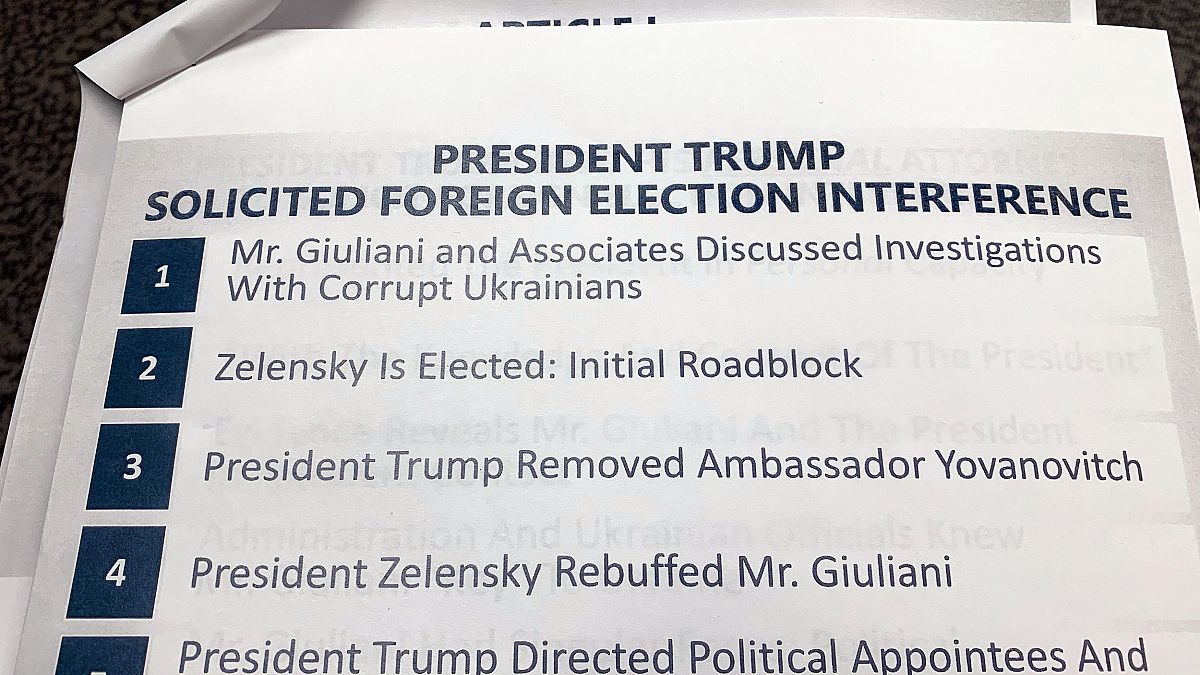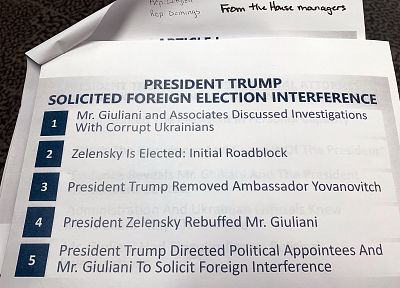A small army of congressional staffers spent weeks crafting the case — working to prepare elements long before the House managers were even named.
WASHINGTON — Standing in the well of the Senate chamber on the second day of President Donald Trump's impeachment trial, House Judiciary Committee Chairman Jerry Nadler, D-N.Y., played a video clip of a senator reinforcing a key Democratic argument: that a president doesn't need to commit a crime in order to commit an impeachable offense.The star of the 21-year-old footage: Sen. Lindsey Graham, R-S.C., one of Trump's most vocal Senate supporters, who during the 1999 trial of President Bill Clinton made the exact opposite point of Trump's current defense team.Two decades after his stint in that role, the carefully polished multimedia presentation by Democratic House managers has born little resemblance to the analog case Graham labored over. Which isn't surprising, since it's the first presidential impeachment of the social media age.The seven House managers may have technically had less than a week to prepare for the trial after they were named by House Speaker Nancy Pelosi, D-Calif. — but the case they presented was far longer in the making. It included precisely cued videos, professional charts and graphics, and crisply written arguments made by the corps of managers in choreographed succession.The elements were crafted by a small army of congressional staffers on the House Intelligence, Judiciary and Oversight Committees, with close involvement by Pelosi's office, according to a Democratic aide working on impeachment.The result of that push has included scores of those videos. On the first day of both Clinton's and Trump's impeachment trials, there were clips of the president himself speaking. But on their first day of arguments alone, Democratic House managers also included more than 100 moments selected from key testimony given during the House impeachment inquiry last year. And there was footage of acting White House chief of staff Mick Mulvaney telling reporters in the White House briefing room that there had been a quid pro quo involved in the president's decision to freeze U.S. aid to Ukraine, and archival elements such as Graham's comments.The effort is also evident in dozens of graphics. The posterboard-and-easel presentations of two decades ago have given way to giant screens displaying images of everything from text message exchanges by key figures to full-screen pull quotes and newspaper articles, with senators given advance print-outs of the slides.Finally, the arguments themselves, spearheaded by former prosecutor and House Intelligence Committee Chairman Adam Schiff, D-Calif., in a presentation that The New York Times quickly dubbed "meticulous and scathing." Veteran prosecutor Chuck Rosenberg, an MSNBC analyst, said on the network Thursday, the second day of arguments, that he "stands in awe" of the managers' presentation."The graphics, the videos, the performance of the current impeachment are striking — and can be partly attributed to the immediacy and reach of social media," said Joanne Freeman, professor of history and American studies at Yale University. "As soon as words are uttered on the Senate floor, they're immediately tossed into a roiling emotional storm of public partisanship. Adam Schiff's emotional closings pierce the noise of that storm — for some. It remains to be seen if that kind of immediacy will make a difference."
The Trump impeachment managers' use of House testimony excerpts was "skillfully organized," said Donald Wolfensberger, a congressional scholar at the Woodrow Wilson International Center. "In 1999, on the other hand, I don't recall any similar visuals used by Clinton impeachment House managers" though, he noted, "the Starr report would have been tricky to visually dramatize."Rep. Jamie Raskin, D-Md., a member of the House Judiciary Committee who regularly attended the closed-door depositions of key witnesses during the inquiry, said that Democrats had been prepping for the trial since the two articles of impeachment were adopted.The committee counsel and staff "were getting ready for this when everybody else was on Christmas vacation, and nobody really knew who was going to be the managers," Raskin told NBC News.Staffers tasked with prepping the case divided the presentations for each impeachment manager into different thematic units, Raskin said, a division of labor that made it easier for each manager to focus on their slice of the case and related supporting evidence.Staff members worked through the holidays following the House's impeachment vote to prepare drafts of possible remarks for House managers, who then refined them ahead of the trial, the Democratic aide said — likely benefitting from the month-long delay Pelosi took before sending the articles over to the Senate.The seven managers spent the weekend before the trial reviewing materials, their trial brief and other evidence.Rep. Zoe Lofgren, D-Calif., for instance, was home in San Jose "devouring documents," according to spokeswoman Ally Kehoe. This is Lofgren's third impeachment experience on the Hill — she was a House Judiciary Committee staffer during the Nixon impeachment investigation, and served on the Judiciary panel as a lawmaker during the Clinton impeachment.Lofgren, who carries around a copy of the Constitution, has kept the 1974 report on the constitutional grounds on presidential impeachment with her on the Senate floor.On Sunday, managers met to discuss their strategy, review their arguments and add their own voices to make their case, the Democratic aide said. On Monday, a day before the trial began in earnest, the managers did a walk-through on the Senate floor to take turns at the lectern and visited the anteroom off the floor where they planned to work with staff during the breaks from the trial, the aide said.The presentations made by the managers have not been set in stone, but are updated constantly."You'll see one of the lawyers or even a manager get up from the table and go back to the preparation room to get a piece of evidence, to get a document, to plan an argument. So that is something that happens in real time," the aide said.Each day ahead of the trial, the managers have met with senior counsels and received an outline of suggested arguments, the aide said. At the end of the day, the managers have met with staff. And while the opportunities for sleep have been limited, Democrats have implemented a night shift for staffers from each of the committees involved so that they can prepare material for the following day.In announcing the managers, Pelosi noted that among other things, nearly all had a background in law and were comfortable in a courtroom. Schiff, a Harvard Law School graduate, spent seven years as a federal prosecutor in the U.S. Attorney's Office in Los Angeles.Graham himself seemed impressed with Schiff's performance. "Good job, you're very well-spoken," he told Schiff as they shook hands after opening arguments late Wednesday.Sen. Lisa Murkowski, R-Alaska, seen as a possible vote with Democrats to extend the trial to allow witness testimony and documents, told reporters Thursday that the presentation by the managers a day earlier was "long" but "pretty thorough."The bigger question: how to measure the success of the effort, given the all-but-certain outcome of the trial — acquittal.Raskin said the presentation is aimed at the senators who will decide whether to remove the president from office. But "the truth is that the Republican senators will only be moved if the American people are moved," he said. "So the immediate audience is the American public, and the ultimate audience is the senators."And even if lawmakers are unlikely to be swayed in the short-term, Democrats are wagering that voters might eventually be."If [senators] don't convict and they don't decide to remove, then the public will see that it was rigged, that it wasn't fair," House manager Rep. Sylvia Garcia, D-Texas, told NBC. "Because everyday Americans know what a fair trial is. And that includes witnesses, it includes testimony, it includes both sides having a fair shot at presenting their case."

